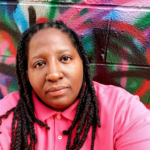This post originally appeared in the PLACES Connection September 2021 newsletter.
BY Dion Cartwright, Director of Equitable Initiatives and Leadership Development
In these recent months, and honestly this past year, I’ve discovered the power of saying no.
If you know me, you know it’s not something that comes easily. I tend to do everything in my power to say yes, to help a friend, colleague, or family member. One thing that 2020 taught me was that I needed to choose me first sometimes. That I needed to be mindful of my own physical and mental wellbeing. It was a year that reminded me that in order to do for others, I had to do for myself. I know it sounds cliché, but we all know it’s much easier said than done.
As a Black woman, I was taught early in my life that I needed to be a super woman. Sacrificing my own mental and physical health for others. I didn’t learn this through words someone told me, but through what I observed from my mother, my grandmother and so many others who influenced my way of thinking. We’re shown a level of resilience that few could ever match. We’re shown how to choose others over ourselves, how to be mentally stronger than everyone else, how to be a big rock even when you’re feeling like a pebble. All of this, often for a capitalist American system that puts us at the bottom of the totem pole.
The conversation about mental health has increased as we battle an ongoing pandemic and continue to confront, challenge and process systemic injustices. Celebrities and athletes from across the globe are also opening up about their own mental health struggles, like Naomi Osaka, Simone Biles and Meghan Markle, to name just a few.
We need folks in philanthropy to honestly address mental health in our own sector, especially the often-ignored traumas endured by our BIPOC colleagues. We talk about being responsive to the needs of communities of color in our grantmaking, but sometimes forget that BIPOC folks in philanthropy are part of those very same communities, and that they — along with their loved ones — are often on the frontlines of the crises we are working to address.
We also lack honesty about the white supremacist culture that exists within philanthropic institutions and how that culture causes harm, causes trauma, and often forces those individuals to leave philanthropy all together. We are at a place where this behavior should no longer be acceptable. We need our white peers, and white leaders in particular, to begin prioritizing and normalizing the mental and physical health and wellbeing of BIPOC individuals. Encourage selfcare. Support the use of vacation time. Remind folks that they are worthy of being valued, being cared for, taking a deep breath, resting.
We must prioritize humanity. That’s love.
About PLACES
PLACES — which stands for Professionals Learning About Community, Equity and Sustainability — uses learning, coaching and reflections to explore structural racism, community empowerment and equitable grantmaking practices. In addition to the PLACES curriculum, Fellows learn from the people and places we visit. Our Fellowship Cohort, selected annually from a highly competitive pool of applicants, embarks on year-long journey that includes four site visits to communities across the U.S. and Canada.
The PLACES Fellowship concludes with a capstone presentation and graduation — but that rarely marks the end of the PLACES experience. As any PLACES alum will tell you, the deep bonds and professional connections forged by the Fellows extend well beyond the end of their cohort year. Learn more about the PLACES fellowship and alumni here.
About the Author
 Dion Cartwright is TFN’s senior director of equity initiatives and leadership development, directing the PLACES Fellowship program and leading the organization’s work to address equity, inclusion, and structural racism. She was a 2010 PLACES Fellow and chaired the PLACES Advisory Board for four years before joining TFN’s staff.
Dion Cartwright is TFN’s senior director of equity initiatives and leadership development, directing the PLACES Fellowship program and leading the organization’s work to address equity, inclusion, and structural racism. She was a 2010 PLACES Fellow and chaired the PLACES Advisory Board for four years before joining TFN’s staff.
Photo by PhotoMIX-Company is licensed under CC BY-NC-SA
